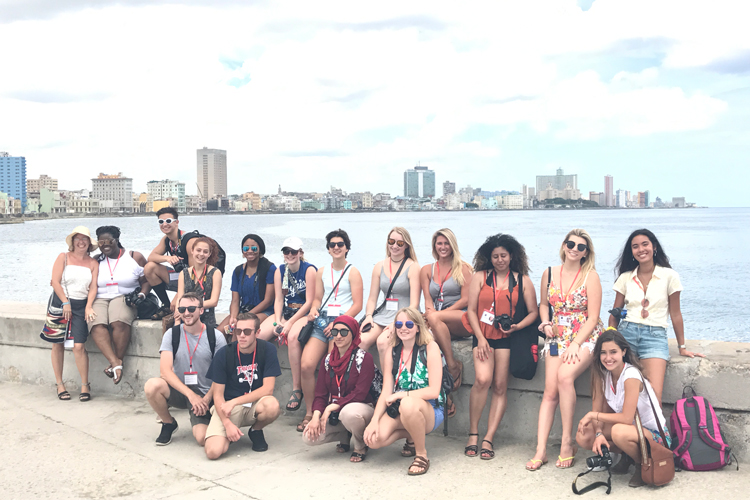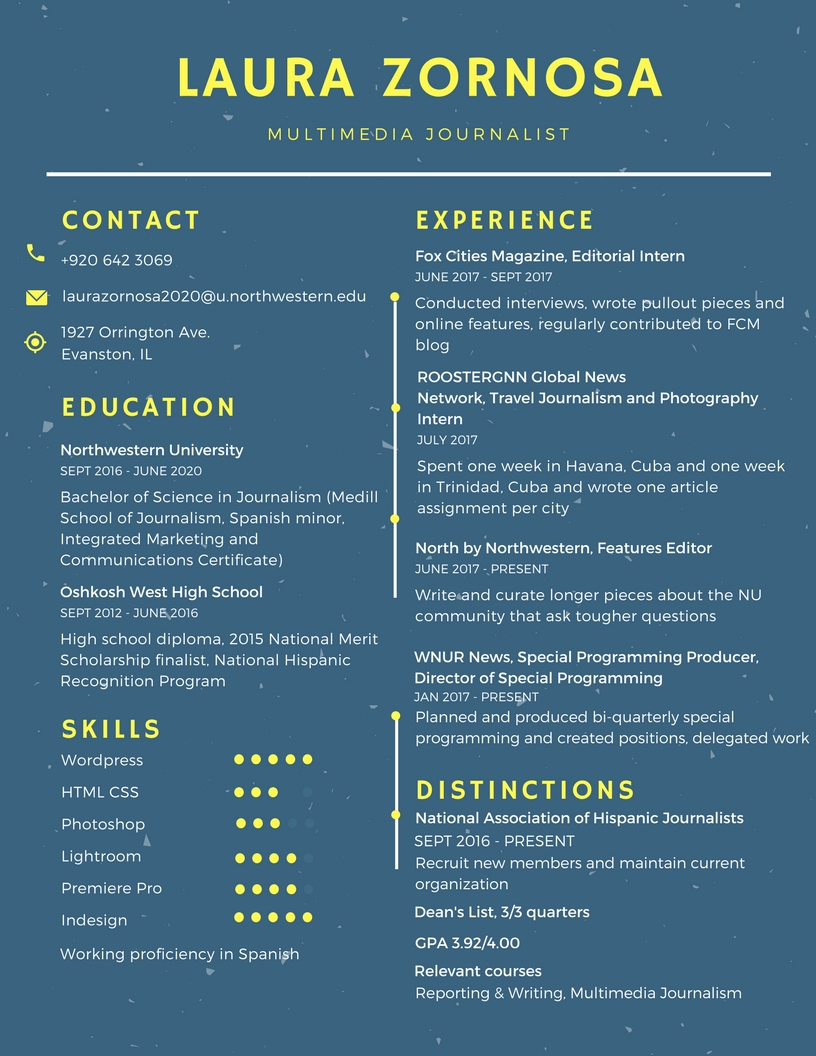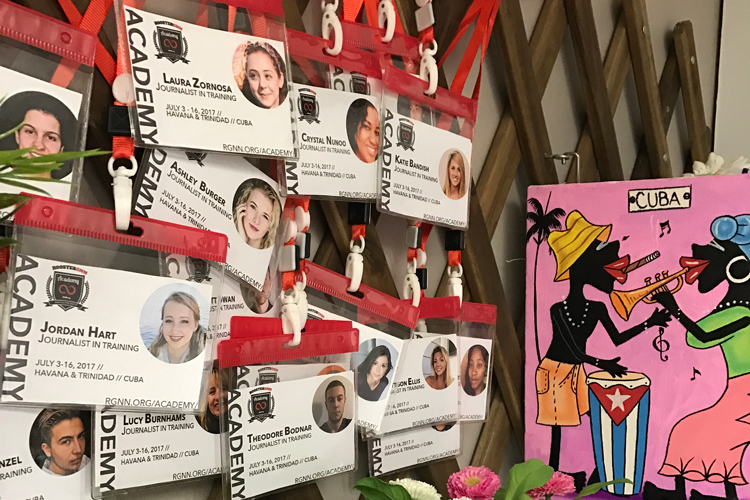In Part I of this series, we asked you to take inventory of what you did during your internship abroad. Once you have reflected on your internship abroad, let’s take a look at your resume and how to update it, incorporating your international internship experience.
Don’t wait too long to update your resume – it is best if all your internship experience is still fresh in your mind!
Resume Tip #1: One resume for every job application
Writing a specific cover letter for every position is a well-known tip. But you should tailor your resume to every position as well. So, the first step is to determine what you will be using your resume for. In most cases, it will be to apply for a specific job or internship position, although I have seen some students post a standard resume on their website as well, which is especially common for freelance journalists, for example.
Let’s focus on editing your resume for a specific job or internship application. Before you even start editing: READ THE JOB DESCRIPTION.
What you want to find out are two things (apart from compensation, of course): what are the responsibilities you would be fulfilling at this job? And what skills and knowledge is the company looking for in an ideal candidate? Don’t be one of those candidates who simply clicks on “Apply Now” just because the company or location looks glamorous. This will come through in your resume, cover letter, and at the latest in your interview, so know what you are applying for.
The key is to pay attention to the verbs and nouns used in the job description, and incorporate them throughout your resume (without making it look too obvious, of course – you don’t want to just copy the job description into your resume!).
In fact, did you know that, especially at large companies, robots are being used to filter out resumes (it’s called ATS, applicant tracking system). That’s an entire world in itself, here’s a useful article from Fast Company on how to trick them into getting your resume to the top of the pile. The key is to use, but not overuse, keywords throughout your resume, based on the job description your are applying for.

On the Malecón in Havana, Cuba, during our Internship Seminar in Cuba | ROOSTERGNN Academy
Resume Tip #2: Break it up!
The main sections of your resume should be Education, Experience, and Skills.
Additional sections can include an Objective at the top (optional, but if you do incorporate it PLEASE make it specific for every job you are applying for!), Awards/Honors, Other (many people like to include hobbies in their resume, but my personal opinion is to only do so if they are relevant).
Specific skills such as Languages can either be incorporated under Skills or be a heading in themselves – chances are if you went abroad you will want to highlight your language skills so make that a separate section. Indicate your level “Basic,” “Intermediate,” “Advanced,” etc. (make sure you are honest about this, you may be asked to speak in that language in an interview!). To further highlight your language skills, you can also mention in your internship experience section that, for example, you “used Spanish skills to present products to clients and answer phone calls.”
GoOverseas has a good list of skills that you might have learned while abroad, including the following. Think about how you learned some of these abroad, and transfer them to possible job and internship applications.
- Independence
- Problem-solving skills
- Decision-making skills
- Time management
- Money management
- Increased initiative
- Global awareness
- Intercultural communication skills
- Adaptability
- Increased confidence and responsibility
- Networking skills
- Perhaps even improved job-related skills such as writing, interviewing, research or photography.
In the Skills section you can specifically highlight your acquired skills, but more than just listing them there, try to make them apparent throughout your Experience section, too.
And don’t forget your Contact information at the top, of course, but we were just about to get to that.
References on resumes are optional, I suggest you only include them if the employer has asked for them.
Resume Tip #3: Education or Experience first? You decide!
Whether or not you will want to place the Education or Experience section first will come down to if you have a lot of experience. Candidates who have been in the field for a long time, and have a lot of experience to show for it, will include Education at the bottom as it is less relevant. If you are a student or recent graduate, chances are you will have less experience and should include your Education section at the top.
Some career advisors also advise that you can call the Experience section “Relevant Experience” or even “International Experience”. This is especially useful if you want to highlight your recent internship abroad. Make sure that the locations of where you interned abroad are clearly visible, such as by aligning them on the right side of the page margin. Include the dates of all internships abroad and other positions as well, as you would in a regular resume.
Some students are also following a two-column resume format. One of our RGNN Academy students, Laura Zornosa, has done a particularly good job at this, see her resume below, which is publicly available on her website (https://www.laurazornosa.me/resume/). (Perhaps posting it her will even get Laura some freelance job, go Laura!)

RGNN Academy student Laura Zornosa, incorporating her internship with us in Cuba on her resume, which she has posted on her website | Laura Zornosa
Resume Tip #4: Be specific about your success
Again, as you would in a regular resume, be specific about your success; use compelling verbs to highlight your achievements, and accompany them with statistics if you have them (e.g. “collaborated with a multinational team of 40 writers” or “increased sales by 7% within 6 months abroad”).
As a CEA tipsheet advises, “keep your verbs active! Action words like immersed, cooperated, translated, exchanged, practiced, recognized, navigated, adapted, shared, and learned e ectively communicate what you gained from your time overseas.”

All students at ROOSTERGNN Academy receive an accreditation at our Internship Seminars from Day 1 | ROOSTERGNN Academy
Resume Tip #5: Leverage social media
As someone who works in communications, I strongly also advise candidates to include their social media profiles and personal website (if you have one, which you should absolutely think about if you want to work in journalism or communications!).
If you are applying for a more “private” sector (think banking, for example), then that might not be necessary, but be advised that recruiters across the board are now (1) Googling candidates before they set up an interview, and (2) checking their public and private social media profiles. So, your best bet is, as I have advised in a related article, to keep your social media profiles clean and to Google yourself every once in a while.
Set up a Google alert for your own name to be notified every time something is posted.
If you have a very common name (e.g. John Smith) you might receive a barrage of alerts, and might consider to market yourself with an identifier, e.g. “John Smith journalist” instead. Jeffs Goins, a writer, does this for example, marketing himself as “Goins writer” instead of “Jeff Goins”: https://goinswriter.com/ He owns both the @JeffGoins and @Goinswriter Twitter usernames, for example.
Resume Tip #7: Make your resume interactive
Just as you would add social media links to your resume, you can make it even more interactive by showcasing links to specific projects you have worked on abroad. For example, during our Journalism, Photography and Video Internship Seminars, students publish a magazine at the end of the program.
List the links to your articles or your author profile in your resume!
If you plan to provide, link or list any internal company projects that are not published publicly, make sure you are not violating any confidentiality agreements. Laws vary from country to country, but generally speaking, do not ever real confidential company information without written permission from the company first.
Also, if you collaborated on a big project but your name is not on it (your boss’ is!), make it clear in your resume what you contributed.
Resume Tip #8: Make it clear how to contact you
When recruiting candidates for diverse entry-level positions, it has happened to me many times that the contact information the candidate provided is not up-to-date. This is an absolute no-no. How is a company supposed to get in touch with you if you provide an old email address or a phone number you no longer use? And moreover, how should a company ever trust you to offer you a position if you cannot even get your own contact information right?
Especially for those who are interning abroad, think carefully about what contact information you are going to provide. When you are applying for the job, are you still abroad? Or are you already back home? How do you expect to be contacted (phone, email, Skype)?
Resume Tip #9: Check international resume templates!
If you are applying for a job in an international location, be it the city where you interned abroad or another destination, be aware of the specific norms regarding resumes in that country. In Spain, for example, it is common to include a headshot photo on your resume and your DNI (Spanish personal identification number, similar to a social security number), whereas in the U.S. that would not be common.
Take advantage of your internship abroad to ask some of your supervisors or colleagues about the norms of resumes abroad, or research online; there are tons of templates (just make sure when you Google you look in the local language, e.g. “curriculum vitae plantilla” for a Spanish result).
This article is the second part in a series of articles on how to market your international internship. Check back next week for Part III, including:
- Cover Letter Tips
- Interview Tips
- Social Media Tips

